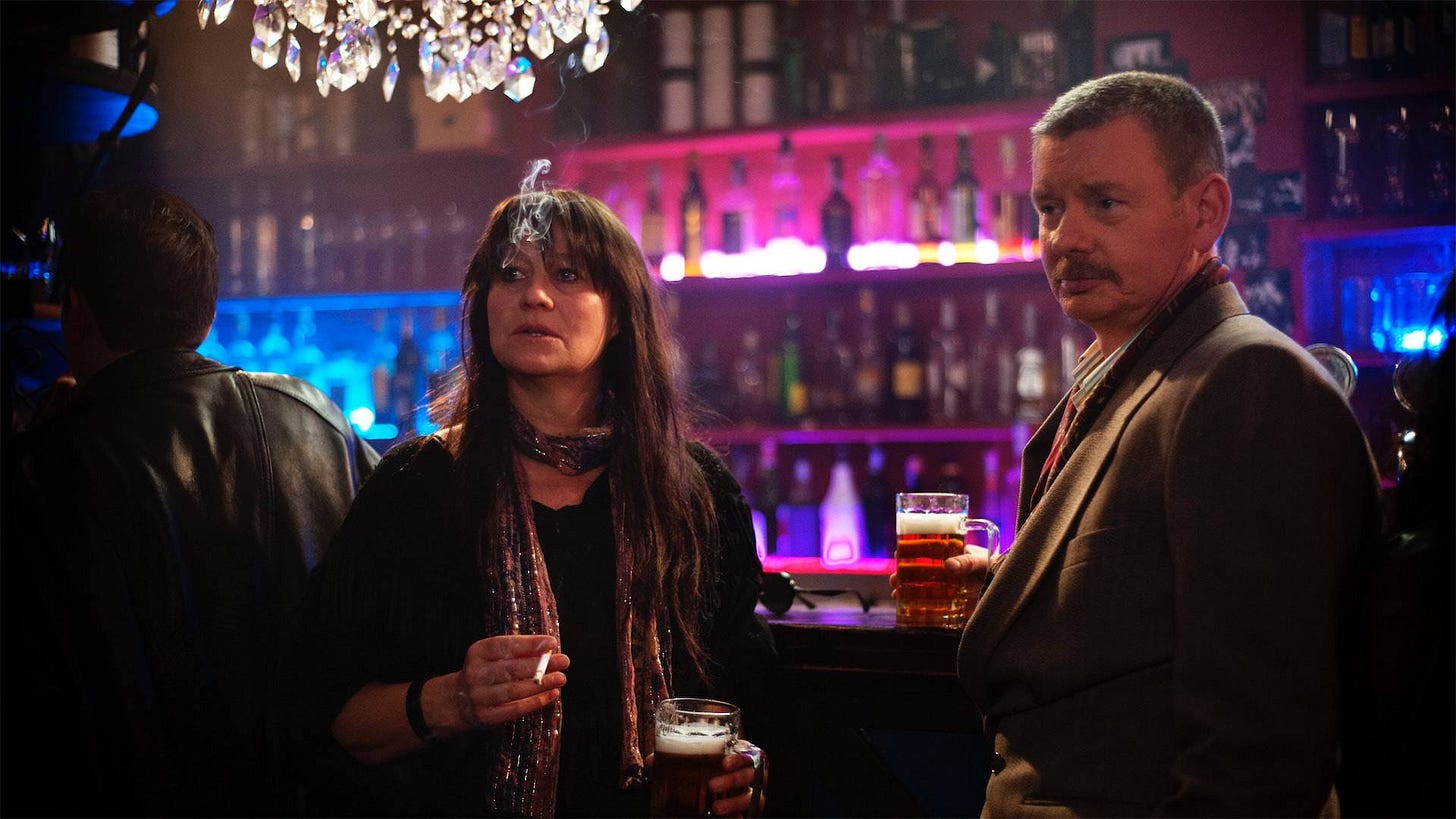As it has been mentioned before, “Walk Hard: The Dewey Cox Story” has, or at least should have, buried all music biopics. You need to find a different way to do them. But what people don’t remember is that there was another great music biopic released right before, “I’m Not There”, that tells the story of Bob Dylan through the stories of his songs, and the iconography of Dylan as opposed to the real person. So, spoofs, and impressionistic narratives that turn a linear life abstract, are two ways to tackle a conventional rise/fall musician narrative.
The third, less popular avenue, is to tell the story of a tiny window in time, a moment not already exhaustively covered by other sources. It helps if it isn’t exactly a musical household name, which is why “Nico 1988” thrives. This is, in execution, the sad tale of a drug addict in her final year. This particular junkie, however, is the music personality known as Nico, the multi-hyphenate who sang with the Velvet Underground before embarking upon a successful solo career.
Nico was an enigma to many, but the public knew her as having that tough, hardened voice combined with that legendary beauty. But “Nico 1988” finds her in year 49. You younger readers might not realize this, but today’s celebrities still look pretty flawless at 49. We’ve been making the same jokes about Paul Rudd for maybe a decade now, and he’s about to turn 56. But Nico in 1988 had aged like the rest of us mere mortals while also nursing a terrible heroin addiction. At 49 years old, she was an old lady. She never made it to 50.
Nico eventually recorded the concert late in the film, where she played Berlin. As the film’s understated prologue makes clear, it was a return home, an honoring of a childhood living in destitution during wartime. Nico is now making her way across Europe on a vast tour that will return her to the home she left behind. Trine Dyreholm plays Nico and while the resemblance isn’t exactly perfect, she conveys the weary troubadour spirit of the singer.
Her handlers are trying to get her on track, but there’s a clear conflict between getting her the drugs she needs to be able to perform (and to nullify the outside world that is deafening to her) and to monitor her drug use so her erratic behavior isn’t taken out on the band or the audience. We see a flicker of her shows, but I can’t recall if we see Nico perform. The movie is more interested in moments like Nico visiting her troubled son, locked up after his own suicide attempt. In their conversation, she shows great compassion while also conceding she is not mother material.
There is a casual cruelty towards Nico in this film, which is written and directed by Susanna Nichiarelli. Not from the storytellers exactly, but in what we see that may or may not be the alleged truth. Nico is 49 and still making those typical junkie promises. And there is the sense she means it too – the idea is that the tour will end, music will be put away, and Nico will “normalize”. The drugs will stop. You’re inclined to believe the woman. The movie ends with Nico still alive and thriving, though a title card informs us she died shortly after in an accident. Maybe she meant it. Maybe Nico would ride off into the sunset, clean and focused. A hypothetical, a cruel one.
There’s an interesting sidebar within the film where Nico confesses that her rock star recklessness is a lifestyle choice in response to her struggle and lack of resources as a child. I have indulged similarly since I got out of prison. Not to a rockstar extent, of course. I got out of prison as a middle aged man, I can no longer go hard like I did in my youth. Still, I have the sort of reckless thought sometimes where a voice in my head will tell me, “You’ve seen great struggle, treat yourself.”
That hasn’t meant substance abuse – my body maybe couldn’t handle that any longer, and as part of the requisite supervised release, I am drug tested by a parole officer. But I was in relatively good health getting out of prison, and I have since remarked that I can buy whatever food I like. Previously, I also lived in a different technological era, and ordering food was a much more primitive activity. Now, I can wake up in bed at 2:30 AM and order an ice cream sundae. I haven’t done that yet – I am still trying to be responsible and at least a little sexy. But the possibilities truly are endless. And sometimes I see bad (legal!) choices and think, after what I’ve endured, could it be considered understandable if I want to be a little reckless?
What I’m trying to convey is that I’m a little boring. But I’m not the first guy to react like this to his freedom. There are men and women everywhere who get out of prison and wildly pursue recreational chaos because it was denied from them for so long. The federal system’s one nod towards moderation is placing you in a halfway house at the end of your sentence, which is done to acclimate yourself to a fast-moving world. But there is nothing in the federal system to caution against a response to those years of institutionalized cruelty, the near-justified decision to put something in your nose, to drop it down your throat, to pursue chaos. Providing said caution would be the government acknowledging their role in the gratuitous diminishment of inmates. The cure, as always, implicates them in the disease.








I willl just mention that, listening to Marianne Faithfull's music after her passing I came across "Song For Nico" -- https://www.youtube.com/watch?v=DFhXL6FJjPs
Which is sympathetic but not close.
Listening to Femme Fatale right now, thanks so much for this review.